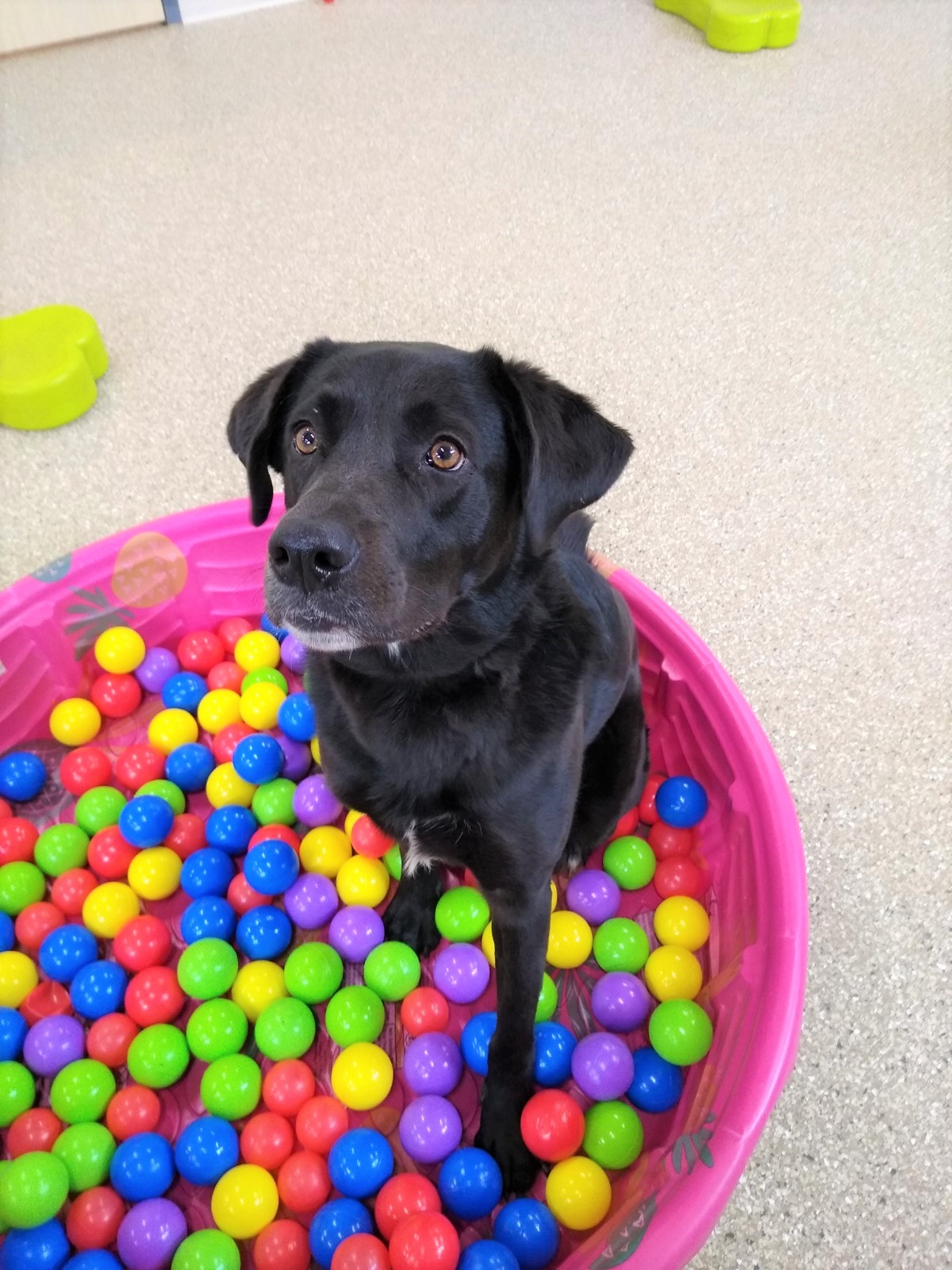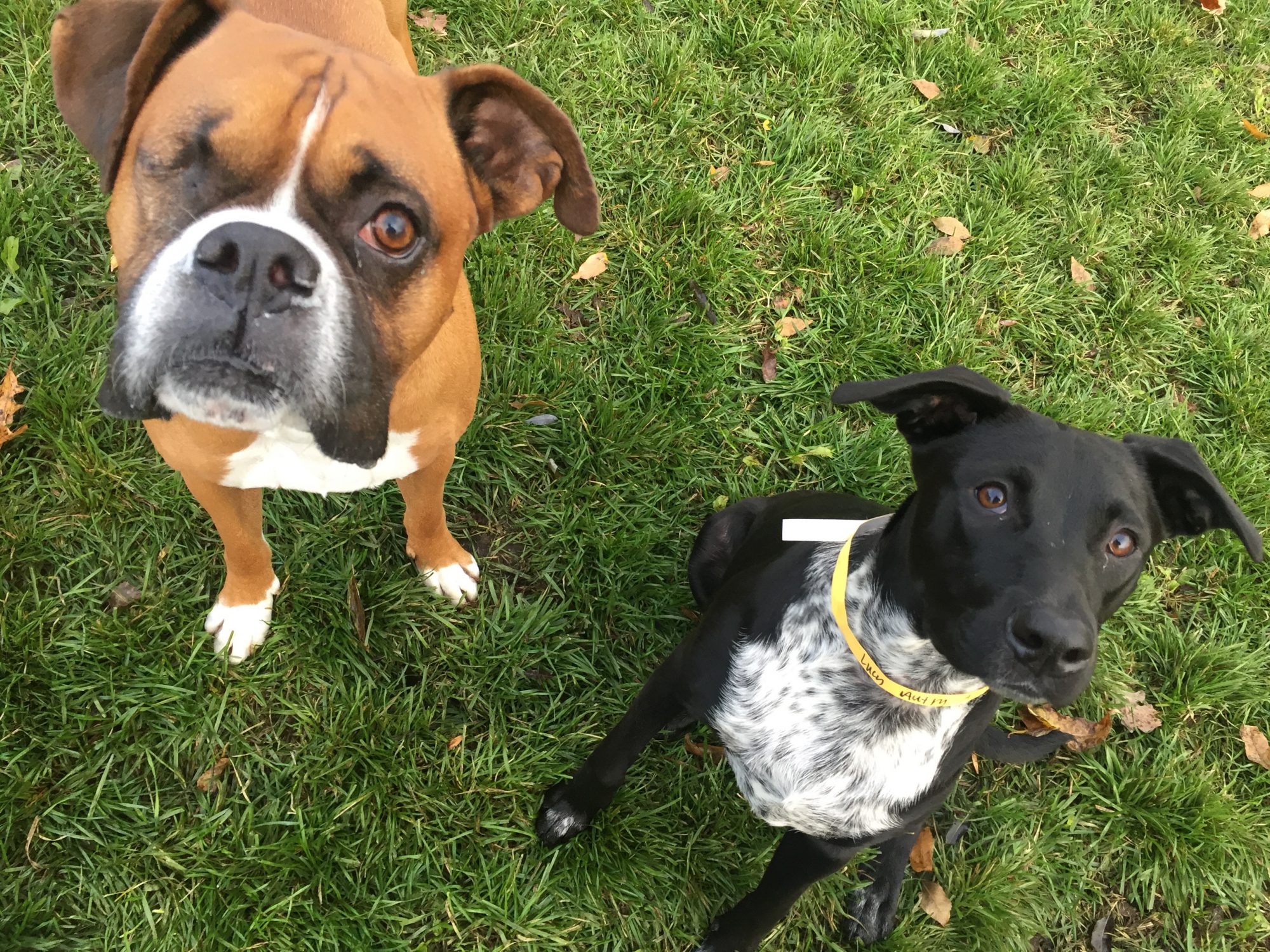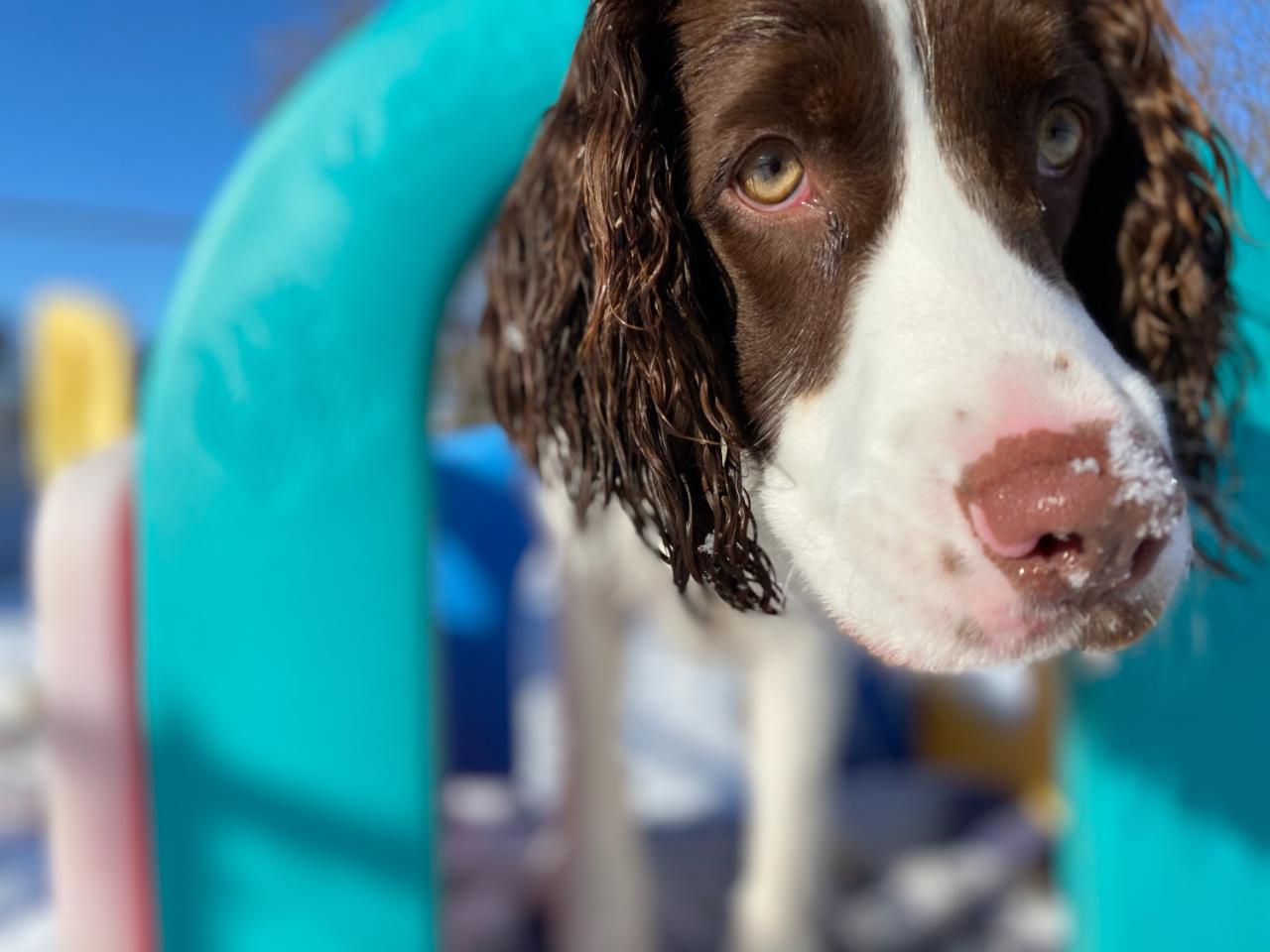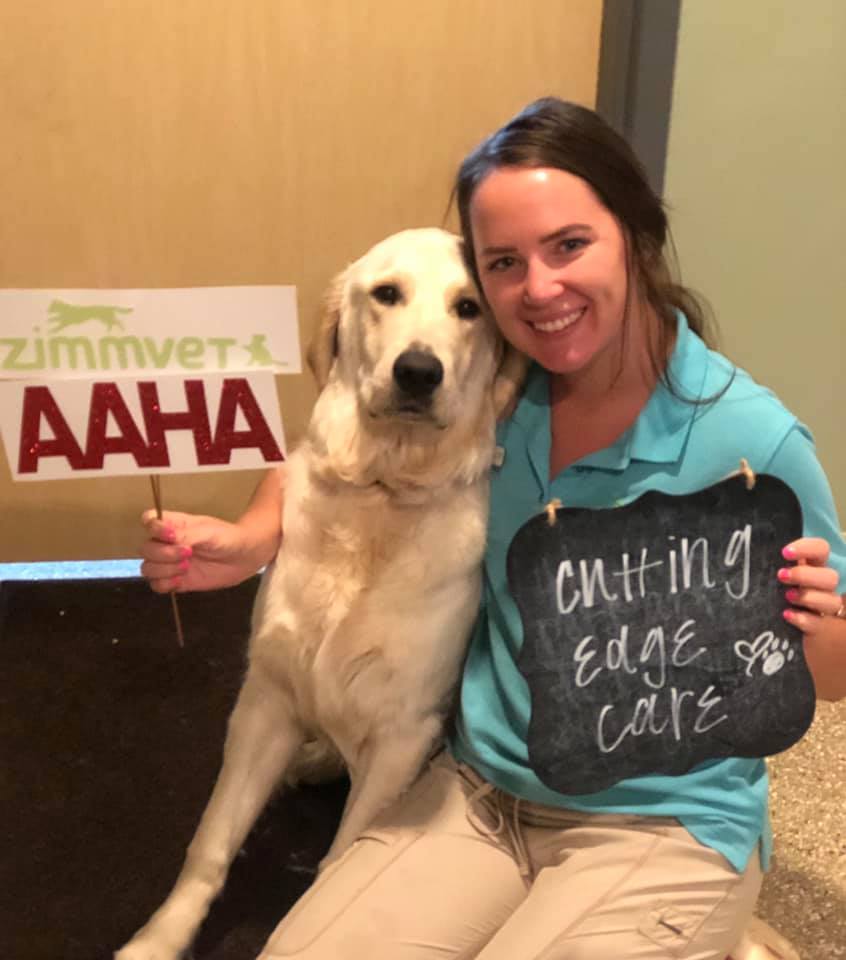Posts in Category: ZimmVet News & Events
5 activities to do with your dog on a rainy day
By: Rebecca Brethorst, CVT at ZimmVet

1). Hide & seek
Sneak away into a different room of the house & hide behind curtains, a shower curtain, or even under the covers. Call your dog’s name out and let them search for you, I can guarantee their tail will be wagging when they find you!
2). Teach an old dog new tricks (or brush up on old ones)
Working on training can be a great way to keep your dog mentally active, even if they’re stuck inside.
If you’re teaching your dog to shake, or just brushing up basic commands – you’re providing your dog with mental stimulation that is not only fun for them, but can also tucker them out. Be sure to keep training sessions at an appropriate length of time. Don’t train so long that your dog gets bored, and make sure they rest so they can retain what they’ve learned.
3). DIY puzzle toy
Take an empty plastic bottle and put a small amount of your dog’s dry food into it, cut a hole only larger than the kibble and watch your dog have fun batting it around to get the food out. Not only will your dog love eating the treats, it is great mental stimulation for your dog to figure out HOW to get the food out!
*Make sure to watch your pet closely to make sure they are not chewing up or ingesting the bottle.
4). Pamper your pooch
Use the opportunity to trim your dog’s nails (if they allow it) and brush out their coat.
5). Dog bowling
This is a fun one! Collect old plastic bottles and place them in a triangular pattern at the end of a hallway. Throw a toy over the bottles so that your dog is the “bowling ball”. Take turns playing with another person and see who can get the most “strikes” or “spares”. This is a sure way to tire out your pooch!
Camping with dogs
By: Valerie Ferguson, Receptionist at ZimmVet

The warm summer months bring many opportunities for camping, and who better to enjoy it with than your fun-loving pup! A successful camping trip starts with planning ahead and packing the right supplies. Although we never want to experience an injury while camping, sometimes it is inevitable and is best handled when we are prepared.
Some of the most important items to bring that most people don’t consider are:
Nail trimmer – have you ever been out in the woods and experienced a broken nail?
Styptic powder – this is very handy to stop bleeding if a nail becomes damaged
Topical bug spray or fly ointment – keeps those pesky insects away from your pet
Extra water – If you are out in the heat or engaging in more activity, your pet will require more water
Bacitracin – A must have for minor scrapes and bug bites
Benadryl (Diphenhydramine) – if your pet has a reaction to a bug bite, it may be helpful to administer Benadryl at the direction of your family veterinarian
Bed – A sleeping pad or bed will keep your pup comfy and dry
Sun block – Not sunblock, dogs don’t wear sunblock silly…something such as an umbrella or a tarp to make a sun block so your pet has a shaded retreat to escape the heat
Be sure to bring enough food, treats, toys and games to keep your pet entertained so they can have a fun vacation too.
Fleas, ticks and mosquitoes are everywhere, especially in the woods – remember to have your pets Heartworm and Flea and Tick preventatives administered prior to going on your adventure.
Never leave your pet unattended in a warm vehicle or tent.
Thunderstorm and Firework Anxiety in Dogs

By Dr. Maria Krenz, DVM – ZimmVet-763-856-4848
Storm season is here! While most of us, both human and canine, are enjoying the season, this is a time when some pets struggle greatly with behavioral issues. Fireworks and evening thunderstorms can wreak havoc on the nerves of a pet who suffers from noise phobias. Signs you may see at home include hiding, panting, pacing, drooling, and/or destructive behavior. With repeated exposure to the stimulus, many pets’ signs become worse over time. So what can we, as their caregivers, do to help them?
Anxiety and noise phobia can be managed with a combination of environmental changes, training, supplement or pheromone sprays and in cases where signs are more severe, oral medications.
The first step in these situations is always to strive for safety. Pets who panic and hide or run with loud noises should be kept indoors or in an enclosed area. Closing curtains and windows to reduce the noises and lights associated with the stimulus while providing distraction with a radio or TV as background noise also helps. The people in the home should remain calm, providing comfort with petting or quietly sitting with the pet. They should avoid giving verbal reinforcement and praise of unwanted behaviors, namely pacing and attention seeking behavior. Giving treats and practicing learned tricks during this time can also help to distract an anxious pet.
There are several alternatives to medications to help with anxiety. The Thundershirt is a stretchy body wrap designed to give constant, reassuring pressure and has been shown to reduce anxious behaviors in dogs. Pheromone products also can help as they naturally reduce anxiety. Adaptil products come as a spray, diffuser, or in the form of a collar. An oral natural product Solliquin, has natural ingredients that help calm the pet. Rescue Remedy is an herbal product that can help calm pets. ZimmVet has these products available for sale in clinic or on our on-line store at ZimmVet.com.
With most pets short term medications (given “as needed”) can be extremely helpful in reducing anxiety and improving comfort during stressful times. Medication such as Trazodone must be given 2-3 hrs in advance to help your pet but can be given on a daily basis if needed. For storms that come up quick when you don’t have hours’ notice Sileo is a great option that works within 30 minutes. Some pets have underlying anxiety that is best managed by daily therapy with additional special dosing during events like these. It is best to have an in depth discussion with your veterinarian about your pets anxiety triggers, the behaviors they are exhibiting, and the goals of therapy. With this information your veterinarian can help you modify the environment and choose the appropriate oral medication and dose for your pet.
Remember- safety first! If your pet is in danger of running away it is very important that he or she has proper identification tags and, ideally, a microchip implanted under the skin. This assures that even on a bad day, everyone comes home safe and sound.
Disclaimer: This written content is meant to be educational and is not medical advice. Always consult a veterinarian about medical advice for your pet.
Becoming AAHA Accredited
By Kristin Rinkel, CVT ZimmVet

AAHA stands for American Animal Hospital Association. AAHA is the only organization that evaluates and accredits small-animal veterinary hospitals in the United States and Canada. Accredited veterinary hospitals are recognized for having some of the highest levels of care in the industry and are continually leading veterinary medicine in growth and high standards for both the patients they see and the staff they employ.
In 2018 the ZimmVet staff decided to pursue the honorary task of becoming an AAHA accredited veterinary practice. Our dedicated team worked very hard on over 900 standards of care that go above and beyond normal state and provincial regulations. ZimmVet was named an AAHA Accredited practice for the first time in April of 2019.
Since 2019 our Zimmvet team has worked very hard to keep up with the over 900 standards and high level of care so that we can provide the best and highest level of medicine for our patients and clients.
AAHA re-evaluates veterinary clinics on a regular basis to make sure the standards of care are being met, and on January 26th 2021 ZimmVet was given the title of “AAHA accredited veterinary practice” for the second time!
To this day, only 12%-15% of veterinary practices in the US and Canada hold the “AAHA-accredited” title.
Dog Bite Prevention
By Dr. Soderberg, ZimmVet 763-856-4848
Dog bites pose a serious health risk to our communities and society. More than 4.5 million people are bitten by dogs each year in the United States, including more than 800,000 who receive medical attention for their injuries. More than half of those bitten are children.
Dogs bite for a variety of reasons, but most commonly as a reaction to something. If the dog finds itself in a stressful situation, it may bite to defend itself or its territory. Dogs can bite because they are scared or have been startled. They can bite because they feel threatened. They can bite to protect something that is valuable to them, like their puppies, their food or a toy.
Dogs might bite because they aren’t feeling well. They could be sick or sore due to injury or illness and might want to be left alone. Dogs also might nip and bite during play. Even though nipping during play might be fun for the dog, it can be dangerous for people. It’s a good idea to avoid wrestling or playing tug-of-war with your dog. These types of activities can make your dog overly excited, which may lead to a nip or a bite.
Continue…The New Normal with COVID-19
By Dr. Maria Krenz, DVM – ZimmVet-763-856-4848

2021 COVID-19 Impacts
Like most businesses in 2020, the veterinary industry was affected by COVID-19. We faced many challenges, including governor’s orders to stop parts of our business, shortages of basic medical supplies and daily business decisions to keep staff safe. Nothing was really expected in 2020, including the huge increase in pet ownership and demand for veterinary care in 2020.
Here are some of the lingering items still happening:
- Carside: The veterinary industry adapted carside appointments to try to minimize COVID spread and keep staff and clients safe. It is difficult to stay six feet apart in exam rooms. Many clinics have continued this practice until their staff are able to be vaccinated.
- Appointments: The days of getting same day appointments are long gone. Wait times for many veterinary clinics are averaging 2-4 weeks or more for appointments. Many clinics are no longer seeing new clients. Emergency clinic waits are also longer than in the past.
- Prices: Supply shortages continue and the supplies that are available are costing us all more. Shortages of medications are now common as well.
What Can Pet Owners Do
- Purchase pet insurance. The cost of veterinary care is rising due to multiple factors including huge increases in medical supply costs and medication costs from manufacturers. Pet owners with pet insurance are shown to provide a more consistent, better level of care for their furry family members. Get insurance when your pet is young and before they have preexisting medical conditions. The most common pet insurance is nationwide www.petinsurance.com
- Schedule in advance for any wellcare as booking out 2-4 weeks for wellness appointments is the new normal.
- Schedule as soon as you notice any illness with your pet. Medical conditions are a lot easier and lower cost to treat early on. Your veterinarian can help you determine the urgency. In some cases, going to an emergency clinic is the best option. At ZimmVet we do set aside appointments every day for same day emergencies. These often fill up as soon as the phones are turned on in the morning.
- Be courteous to others. Cancel your appointment 24 hours in advance or more if you do not plan to attend. There are many owners that are desperate to take that appointment spot.
- Refill medications and food in advance, use delivery and home autoship options. Support your local veterinarian by using their trusted on-line stores that are very price competitive. At ZimmVet.com we have an on-line store that has medication, food and supplies. We also have ProPlan direct for Purina food and Hills to Home for Hills food. Make sure you keep enough medication and food for at least 2 weeks in the case of shipping delays or shortages.
- Use technology. The phone lines at veterinary clinics are overloaded. Use on-line booking tools, text and email. At ZimmVet.com we have many on-line resources including scheduling, and medication refill requests at zimmvet.com.
- Be nice and understand veterinary staff want what is best for your pet. Compassion-fatigue and burnout are common in the veterinary industry. We are part of the community; positive social media posts go a long way in building positive relationships with your veterinary care team.
Disclaimer: This written content is meant to be educational and is not medical advice. Always consult a veterinarian about medical advice for your pet.
Fun in the snow
By Amanda Jelinek, ZimmVet Pet Hotel and Dog Daycare Receptionist

During this snowy season, there are pups that love being outside and playing in the snow. However, it is important to take precautions for your pet during this cold season.
Pet Safe Salts
Ice can be hazardous for you and your dog. It’s important to always keep pet-safe, nontoxic salts around to help prevent any slipping, cut paws, or other injuries for you and your dog. The reason nontoxic and pet safe salts are important is they will prevent any burning of the pads or ingestion issues you could have with regular salts in the winter. This is also important to keep in mind when taking your dog on walks or traveling with them. Always keep a close eye on them around any salts, or de-icers you did not put down.
Paw Care
It is also very important to keep up on taking care of your dog’s paws in the winter. Making sure their nails are trimmed will help prevent slipping and keep their nails from digging into their paw pads. If you have a longer haired dog it’s also important to keep your dog’s pads shaved and their feet fur trimmed. This will help prevent snow from accumulation in the paws, and becoming uncomfortable for your pup.
Coat Care
Keeping your dog’s coat clean and brushed out will also do wonders for them in the winter! Taking a few minutes each time they come in from a play session outside to dry them off and brush them out (if long coated) will help maintain a clean and healthy coat.
Continue…Fun Projects to do with Your Dog
By Lena Hansen, ZimmVet Pet Hotel and Dog Daycare Manager
If you have a day off from work and are wondering what to do with your day or if everyone in your household is home for the weekend, spend the afternoon creating fun crafts with your dog to get the entire family involved in quality bonding time.
Here are some cute craft ideas to do on a rainy day:
Pawprint Paintings

Using pet safe finger paint, press your dog’s paw in some color and then use it to draw a fun picture to hang on your fridge. The painting doesn’t have to be just of a pawprint. You can use the pawprints to form fun themes for holidays, like fireworks and flowers. Have fun with it and experiment. But make sure to go slow with your dog so they don’t get stressed out, and always reward with treats throughout the process so it’s fun for them too.
Pawprint Ornaments
You can make these ornaments with simple ingredients in your pantry. Using ½ cup of salt, ½ cup of flour, and 1/8 cup water, just mix everything together and it will create a moldable dough. Flatten the dough out to shape how you would like your ornament and make sure it allows for enough space to place your dog’s pawprint. Take your dog’s paw and press it firmly into the dough. Then place the ornament in the oven for a couple of hours on a low heat setting (150-200 degrees). And that’s it. The dough will harden and create a cute ornament that you or your kids can paint and decorate to put on your tree.
Rope Toys
Your dog might not be able to participate in making this one, but they will surely anticipate the gift once it’s finished. You can make a rope toy for your dog by cutting strips out of an old shirt or a fleece blanket and braiding them tightly together. The easiest way is to line up 9 strips and tie them at the top with a secure knot. Then separate the strips into 3 sections and braid each section together from the knot down. If you want to create a more advanced rope toy, there are plenty of videos online that will help you create the perfect toy for your beloved pet.
How to keep your cat healthy
By: Laura Scharenbroich ZimmVet Daycare Staff
When was the last time you brought your cat to the veterinarian? Was it within the last year? A couple years ago? Even if your cat appears to not be sick, there are still preventative ways to keep them healthy.

Here are 7 great tips to keeping your cat healthy:
- Groom your Cat
Most cats groom themselves on a regular basis. But you can help your furry friend by brushing or combing. This will help to remove any dead hair so they don’t ingest while self-grooming. This also gives you a chance to notice any changes to the body.
2. Make sure you have enough litter boxes
A good general rule of thumb to go by is one litter box per cat plus one more. So if you have two cats, go with 3 litter boxes. To help encourage good litter box habits, keep the litter boxes clean. Regular cleaning will also help you notice if anything is out of the ordinary.
3. Use a Scratching Post
If your cat’s claws are still intact be sure to supply some form of scratching post. This helps your cat stretch out their muscles and also helps remove old layers from their nails. Scratching is a normal marking behavior and can help with environmental enrichment.
Continue…What is Feliway for Cats?
By: Laura Scharenbroich ZimmVet Daycare Staff

This easy on-the- go spray helps with any stressful event such as car rides and going to the veterinarian. It’s simple. All you have to do is spray directly in your cat’s carrier or basket or spray on your cats’ favorite blanket. During that car ride, re-apply inside your car every 4-5 hours. Always wait about 10 minutes before putting your cat in the carrier or car.
Is your cat stressed at home due to an upcoming move? Simple! Spray on doorways, window sills, and prominent objects around the house. Simply spray once daily to reduce stress.
Never spray directly on your cat and don’t spray on a scratching post, this will deter your cat from using it.
For more information on different types of Feliway, be sure to check out their website at https://www.feliway.com/us


